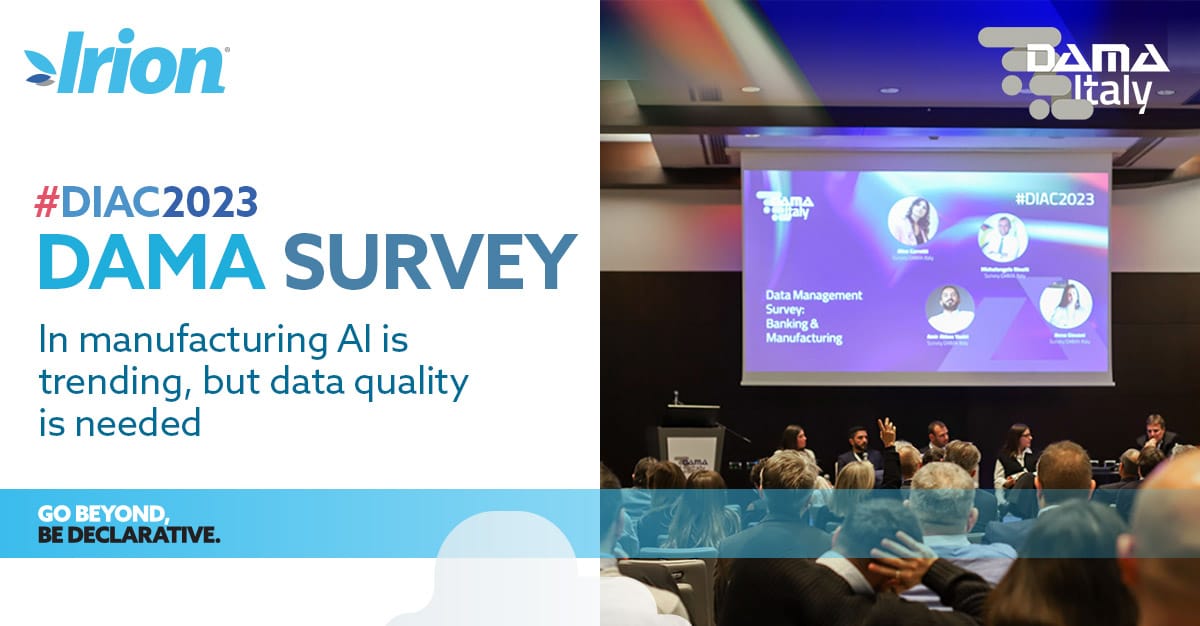Large companies in the Italian manufacturing sector have shown very strong interest in adopting artificial intelligence, but this phenomenon is not always accompanied by high data quality: this is one of the trends that emerged in the DAMA Survey 2023, the annual survey conducted by the Italian chapter of the international Data Management Association. “Everyone wants to travel in first-class… with AI,” we might say, paraphrasing an Italian pop song by Ligabue, but not everyone has taken the necessary actions in the previous stages, such as defining adequate data controls. Research highlights were presented at the annual DIAC convention in Bologna, Italy, in parallel with the EMEA Data Conference involving 30 countries.
Governance and data value among hot topics
Four main hot topics were identified in the responses of participants in the research conducted by DAMA Italy, for the first time 7 manufacturing companies, as well as 13 banks: data valuation, data ethics, generative artificial intelligence, and data governance and its kit of change management activities. The research is now in its fourth edition and in its “radar charts” is able to map the maturity of data management in an organization, on a scale of five levels: 1 initial or ad hoc; 2 repeatable, with minimal process discipline; 3 defined, with standards set and used; 4 managed, with processes quantified and controlled; and 5 optimized, where process improvement goals are also quantified. The 12 data management “knowledge areas” mapped in the survey refer to the “DAMA Wheel” published in DMBok 2, the Data Management Body of Knowledge.
How data is managed in manufacturing
What is then the approach for the “Made in Italy” companies among food, automotive and mechanical engineering surveyed? More than 80% say they have already adopted AI projects, the rest have at least one active pilot project. In some realities, advanced forecasting techniques are in use, for example for managing warehouse stock and reducing waste and scrap. Manufacturing is a relatively “little” regulated area compared to financial services: in the absence of time-bound audits, guidelines and regulations exist but are applied to specific disciplines, especially on the marketing side. In this area, responsibility for Data Quality does not appear to be punctually allocated in the organizational chart, whereas most of the banking organizations surveyed have established a corporate function dedicated to data quality. The biggest challenge in this sector is making the transition from “reactive” Data Quality (on average the level is 1.5) to “proactive,” explain Amir Vaziri and Michelangelo Rinelli of the DAMA Survey team.
How do I organize my production facilities, an industry manager wonders today, in an increasingly prolific world of data and systems? And again: what is the common factor that binds such diverse companies together? Data management today can be the real bridge between IT and Business, all the more so when we consider that regulation is coming in other fields as well, for example, the requirement from 2025 – for all European companies above 50 million in revenue-to have a structured Sustainability Report. And having quality data will help build trust, across the board, in the company. As ESG also becomes an issue that needs compliance and proper use of data, why not take the opportunity to embark (or progress) on the path to Data Driven Organization?
Trends in banking: 2019 vs. 2023
How has the approach to Data Management in banks changed over the past four years? Thanks to the latest edition of the DAMA Italy Survey we can make a comparison: substantially unchanged is the maturity of Data Quality (from 4.0 to 3.8 with enlargement of the sample) and Metadata (from 3.5 to 3.6) while it is growing (from 3.2 to 3.7) that of Data Governance; always very high is the interest in Data Security (4.4 and 3.2). The level of maturity in Data Integration definitely improved (from 3.0 to 3.5), notable progress also in the Document & Content Management “knowledge area,” which rose from 2.6 to 3.6.
During the event our Principal Advisor, Mauro Tuvo, was honored as Data Professional of the Year. Pictured above is a moment of the award ceremony.







